Corporation and Business Structures: Legal Duties and Breaches Report
VerifiedAdded on 2022/08/31
|12
|3065
|18
Report
AI Summary
This report analyzes a business case involving corporation and business structures, specifically focusing on the legal duties of directors and partners under the Corporations Act 2001 (Cth). The report examines the responsibilities of directors, including acting with due care and diligence, acting in good faith, and avoiding conflicts of interest. It also outlines the duties of partners in a partnership, such as conducting business for mutual advantage, acting in good faith, and providing accurate accounts. The analysis considers a scenario involving a company, SRT Pty Ltd, and its directors, Sam and Mrs. Rosa, alongside a partnership, C&M, and its partners, Charlotte and Mia. The report investigates potential breaches of these duties, such as the directors' failure to prevent insolvency and the consequences of such breaches. Furthermore, the report delves into the defenses available to directors under the Act, such as those related to reasonable grounds for solvency and reasonable steps taken to prevent liquidation. The report concludes by summarizing the breach of duties by the parties and emphasizing the liabilities that they would have to face as a consequence of their actions. Finally, the report also delves into the defenses available to directors under the Act.
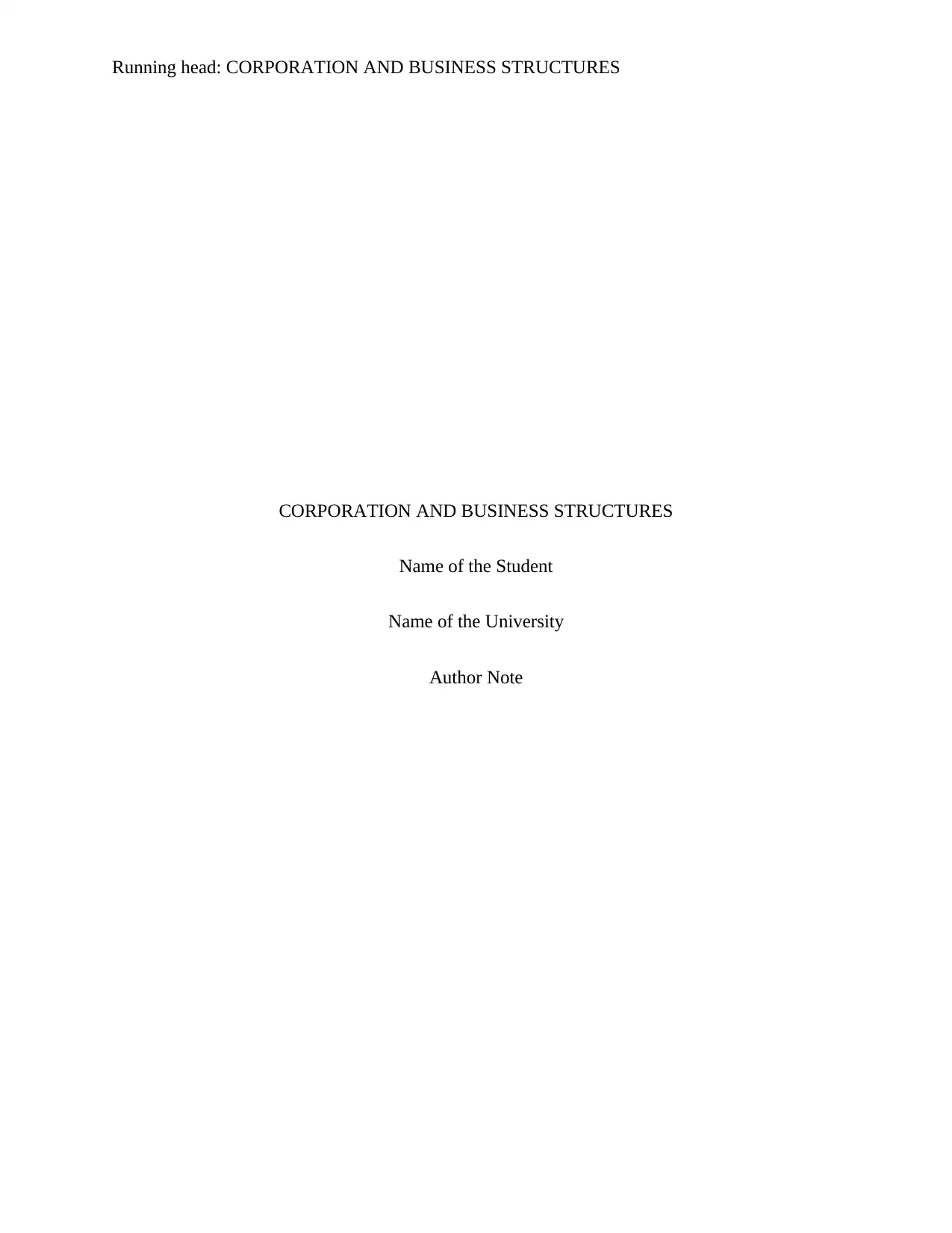
Running head: CORPORATION AND BUSINESS STRUCTURES
CORPORATION AND BUSINESS STRUCTURES
Name of the Student
Name of the University
Author Note
CORPORATION AND BUSINESS STRUCTURES
Name of the Student
Name of the University
Author Note
Paraphrase This Document
Need a fresh take? Get an instant paraphrase of this document with our AI Paraphraser
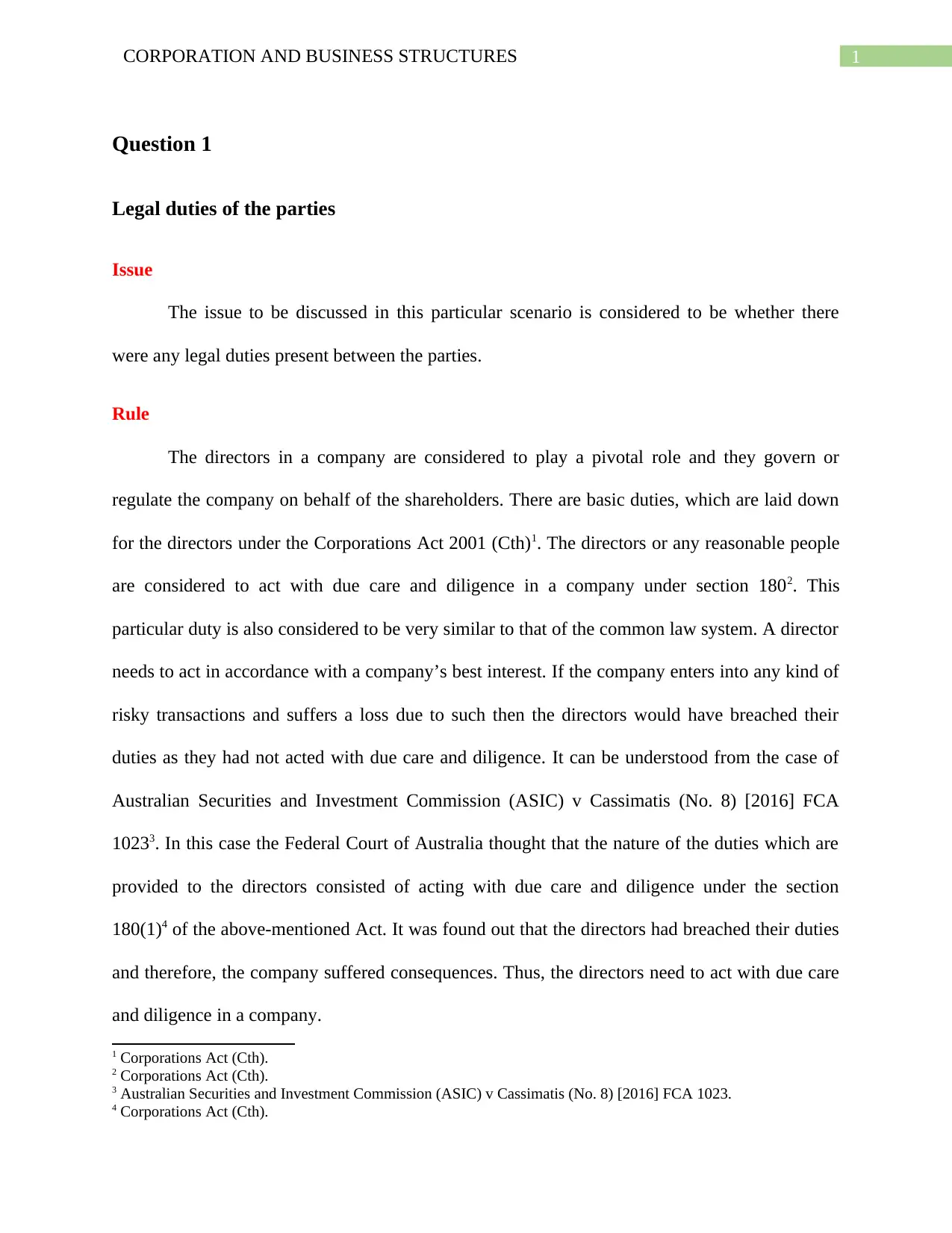
1CORPORATION AND BUSINESS STRUCTURES
Question 1
Legal duties of the parties
Issue
The issue to be discussed in this particular scenario is considered to be whether there
were any legal duties present between the parties.
Rule
The directors in a company are considered to play a pivotal role and they govern or
regulate the company on behalf of the shareholders. There are basic duties, which are laid down
for the directors under the Corporations Act 2001 (Cth)1. The directors or any reasonable people
are considered to act with due care and diligence in a company under section 1802. This
particular duty is also considered to be very similar to that of the common law system. A director
needs to act in accordance with a company’s best interest. If the company enters into any kind of
risky transactions and suffers a loss due to such then the directors would have breached their
duties as they had not acted with due care and diligence. It can be understood from the case of
Australian Securities and Investment Commission (ASIC) v Cassimatis (No. 8) [2016] FCA
10233. In this case the Federal Court of Australia thought that the nature of the duties which are
provided to the directors consisted of acting with due care and diligence under the section
180(1)4 of the above-mentioned Act. It was found out that the directors had breached their duties
and therefore, the company suffered consequences. Thus, the directors need to act with due care
and diligence in a company.
1 Corporations Act (Cth).
2 Corporations Act (Cth).
3 Australian Securities and Investment Commission (ASIC) v Cassimatis (No. 8) [2016] FCA 1023.
4 Corporations Act (Cth).
Question 1
Legal duties of the parties
Issue
The issue to be discussed in this particular scenario is considered to be whether there
were any legal duties present between the parties.
Rule
The directors in a company are considered to play a pivotal role and they govern or
regulate the company on behalf of the shareholders. There are basic duties, which are laid down
for the directors under the Corporations Act 2001 (Cth)1. The directors or any reasonable people
are considered to act with due care and diligence in a company under section 1802. This
particular duty is also considered to be very similar to that of the common law system. A director
needs to act in accordance with a company’s best interest. If the company enters into any kind of
risky transactions and suffers a loss due to such then the directors would have breached their
duties as they had not acted with due care and diligence. It can be understood from the case of
Australian Securities and Investment Commission (ASIC) v Cassimatis (No. 8) [2016] FCA
10233. In this case the Federal Court of Australia thought that the nature of the duties which are
provided to the directors consisted of acting with due care and diligence under the section
180(1)4 of the above-mentioned Act. It was found out that the directors had breached their duties
and therefore, the company suffered consequences. Thus, the directors need to act with due care
and diligence in a company.
1 Corporations Act (Cth).
2 Corporations Act (Cth).
3 Australian Securities and Investment Commission (ASIC) v Cassimatis (No. 8) [2016] FCA 1023.
4 Corporations Act (Cth).
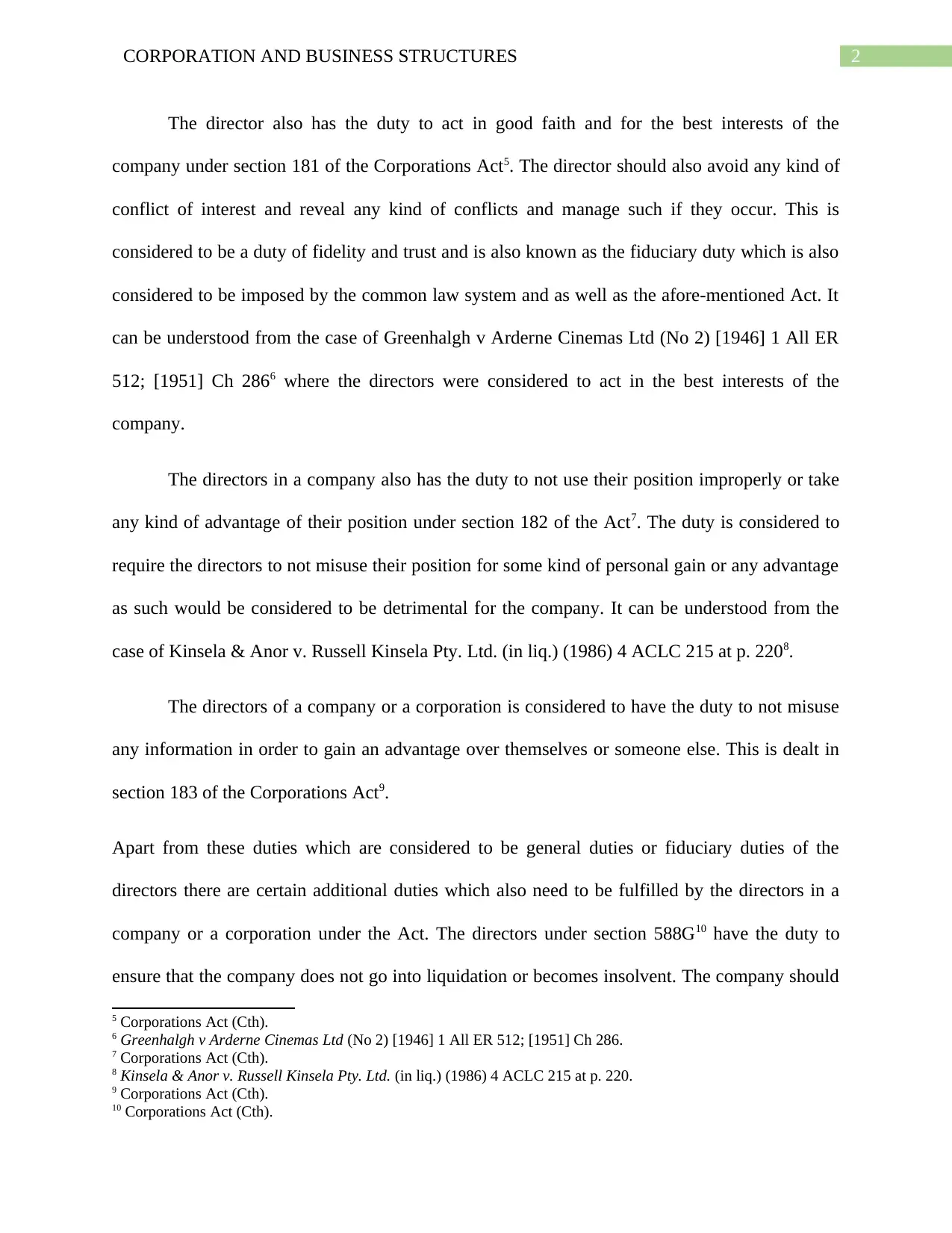
2CORPORATION AND BUSINESS STRUCTURES
The director also has the duty to act in good faith and for the best interests of the
company under section 181 of the Corporations Act5. The director should also avoid any kind of
conflict of interest and reveal any kind of conflicts and manage such if they occur. This is
considered to be a duty of fidelity and trust and is also known as the fiduciary duty which is also
considered to be imposed by the common law system and as well as the afore-mentioned Act. It
can be understood from the case of Greenhalgh v Arderne Cinemas Ltd (No 2) [1946] 1 All ER
512; [1951] Ch 2866 where the directors were considered to act in the best interests of the
company.
The directors in a company also has the duty to not use their position improperly or take
any kind of advantage of their position under section 182 of the Act7. The duty is considered to
require the directors to not misuse their position for some kind of personal gain or any advantage
as such would be considered to be detrimental for the company. It can be understood from the
case of Kinsela & Anor v. Russell Kinsela Pty. Ltd. (in liq.) (1986) 4 ACLC 215 at p. 2208.
The directors of a company or a corporation is considered to have the duty to not misuse
any information in order to gain an advantage over themselves or someone else. This is dealt in
section 183 of the Corporations Act9.
Apart from these duties which are considered to be general duties or fiduciary duties of the
directors there are certain additional duties which also need to be fulfilled by the directors in a
company or a corporation under the Act. The directors under section 588G10 have the duty to
ensure that the company does not go into liquidation or becomes insolvent. The company should
5 Corporations Act (Cth).
6 Greenhalgh v Arderne Cinemas Ltd (No 2) [1946] 1 All ER 512; [1951] Ch 286.
7 Corporations Act (Cth).
8 Kinsela & Anor v. Russell Kinsela Pty. Ltd. (in liq.) (1986) 4 ACLC 215 at p. 220.
9 Corporations Act (Cth).
10 Corporations Act (Cth).
The director also has the duty to act in good faith and for the best interests of the
company under section 181 of the Corporations Act5. The director should also avoid any kind of
conflict of interest and reveal any kind of conflicts and manage such if they occur. This is
considered to be a duty of fidelity and trust and is also known as the fiduciary duty which is also
considered to be imposed by the common law system and as well as the afore-mentioned Act. It
can be understood from the case of Greenhalgh v Arderne Cinemas Ltd (No 2) [1946] 1 All ER
512; [1951] Ch 2866 where the directors were considered to act in the best interests of the
company.
The directors in a company also has the duty to not use their position improperly or take
any kind of advantage of their position under section 182 of the Act7. The duty is considered to
require the directors to not misuse their position for some kind of personal gain or any advantage
as such would be considered to be detrimental for the company. It can be understood from the
case of Kinsela & Anor v. Russell Kinsela Pty. Ltd. (in liq.) (1986) 4 ACLC 215 at p. 2208.
The directors of a company or a corporation is considered to have the duty to not misuse
any information in order to gain an advantage over themselves or someone else. This is dealt in
section 183 of the Corporations Act9.
Apart from these duties which are considered to be general duties or fiduciary duties of the
directors there are certain additional duties which also need to be fulfilled by the directors in a
company or a corporation under the Act. The directors under section 588G10 have the duty to
ensure that the company does not go into liquidation or becomes insolvent. The company should
5 Corporations Act (Cth).
6 Greenhalgh v Arderne Cinemas Ltd (No 2) [1946] 1 All ER 512; [1951] Ch 286.
7 Corporations Act (Cth).
8 Kinsela & Anor v. Russell Kinsela Pty. Ltd. (in liq.) (1986) 4 ACLC 215 at p. 220.
9 Corporations Act (Cth).
10 Corporations Act (Cth).
⊘ This is a preview!⊘
Do you want full access?
Subscribe today to unlock all pages.

Trusted by 1+ million students worldwide
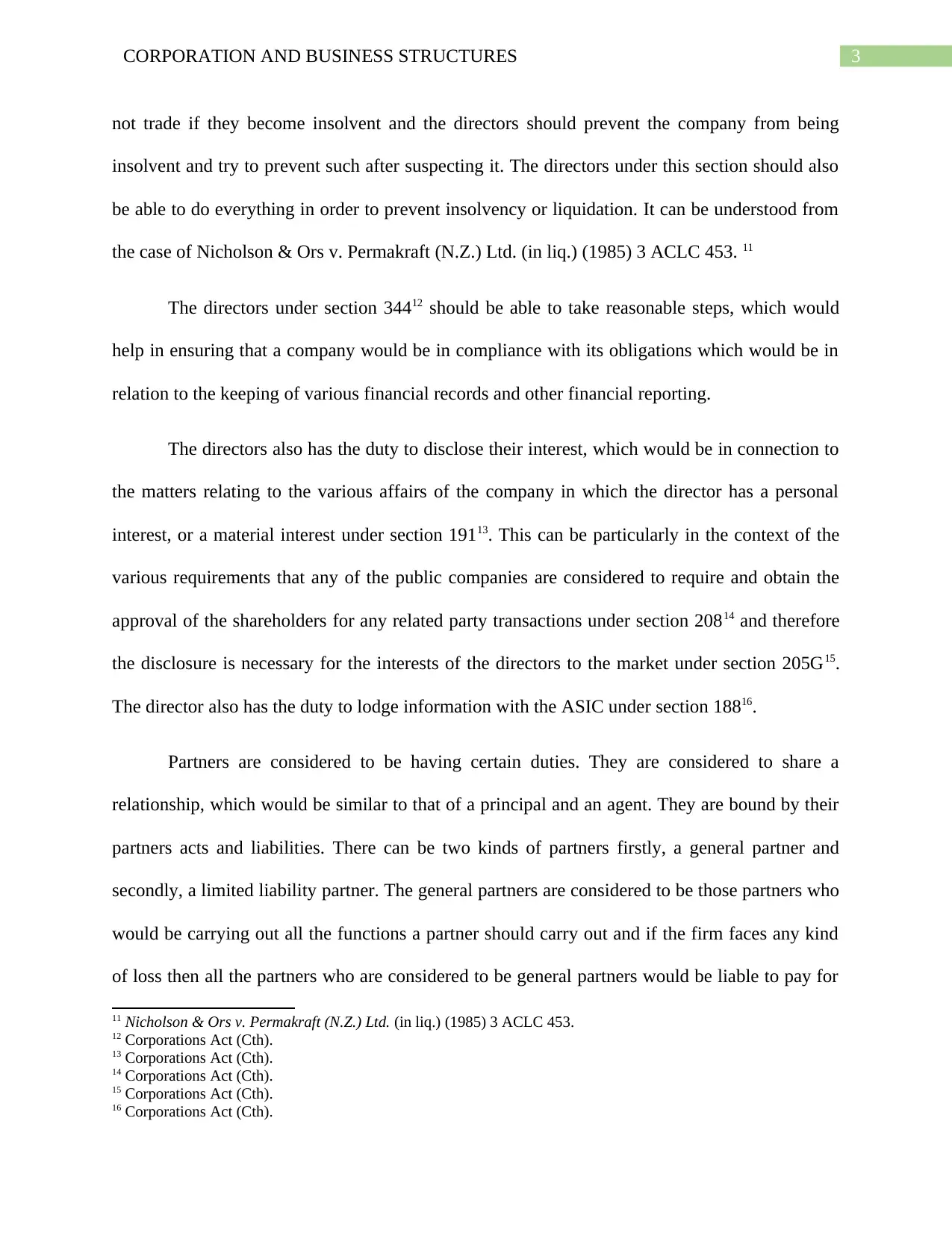
3CORPORATION AND BUSINESS STRUCTURES
not trade if they become insolvent and the directors should prevent the company from being
insolvent and try to prevent such after suspecting it. The directors under this section should also
be able to do everything in order to prevent insolvency or liquidation. It can be understood from
the case of Nicholson & Ors v. Permakraft (N.Z.) Ltd. (in liq.) (1985) 3 ACLC 453. 11
The directors under section 34412 should be able to take reasonable steps, which would
help in ensuring that a company would be in compliance with its obligations which would be in
relation to the keeping of various financial records and other financial reporting.
The directors also has the duty to disclose their interest, which would be in connection to
the matters relating to the various affairs of the company in which the director has a personal
interest, or a material interest under section 19113. This can be particularly in the context of the
various requirements that any of the public companies are considered to require and obtain the
approval of the shareholders for any related party transactions under section 20814 and therefore
the disclosure is necessary for the interests of the directors to the market under section 205G15.
The director also has the duty to lodge information with the ASIC under section 18816.
Partners are considered to be having certain duties. They are considered to share a
relationship, which would be similar to that of a principal and an agent. They are bound by their
partners acts and liabilities. There can be two kinds of partners firstly, a general partner and
secondly, a limited liability partner. The general partners are considered to be those partners who
would be carrying out all the functions a partner should carry out and if the firm faces any kind
of loss then all the partners who are considered to be general partners would be liable to pay for
11 Nicholson & Ors v. Permakraft (N.Z.) Ltd. (in liq.) (1985) 3 ACLC 453.
12 Corporations Act (Cth).
13 Corporations Act (Cth).
14 Corporations Act (Cth).
15 Corporations Act (Cth).
16 Corporations Act (Cth).
not trade if they become insolvent and the directors should prevent the company from being
insolvent and try to prevent such after suspecting it. The directors under this section should also
be able to do everything in order to prevent insolvency or liquidation. It can be understood from
the case of Nicholson & Ors v. Permakraft (N.Z.) Ltd. (in liq.) (1985) 3 ACLC 453. 11
The directors under section 34412 should be able to take reasonable steps, which would
help in ensuring that a company would be in compliance with its obligations which would be in
relation to the keeping of various financial records and other financial reporting.
The directors also has the duty to disclose their interest, which would be in connection to
the matters relating to the various affairs of the company in which the director has a personal
interest, or a material interest under section 19113. This can be particularly in the context of the
various requirements that any of the public companies are considered to require and obtain the
approval of the shareholders for any related party transactions under section 20814 and therefore
the disclosure is necessary for the interests of the directors to the market under section 205G15.
The director also has the duty to lodge information with the ASIC under section 18816.
Partners are considered to be having certain duties. They are considered to share a
relationship, which would be similar to that of a principal and an agent. They are bound by their
partners acts and liabilities. There can be two kinds of partners firstly, a general partner and
secondly, a limited liability partner. The general partners are considered to be those partners who
would be carrying out all the functions a partner should carry out and if the firm faces any kind
of loss then all the partners who are considered to be general partners would be liable to pay for
11 Nicholson & Ors v. Permakraft (N.Z.) Ltd. (in liq.) (1985) 3 ACLC 453.
12 Corporations Act (Cth).
13 Corporations Act (Cth).
14 Corporations Act (Cth).
15 Corporations Act (Cth).
16 Corporations Act (Cth).
Paraphrase This Document
Need a fresh take? Get an instant paraphrase of this document with our AI Paraphraser
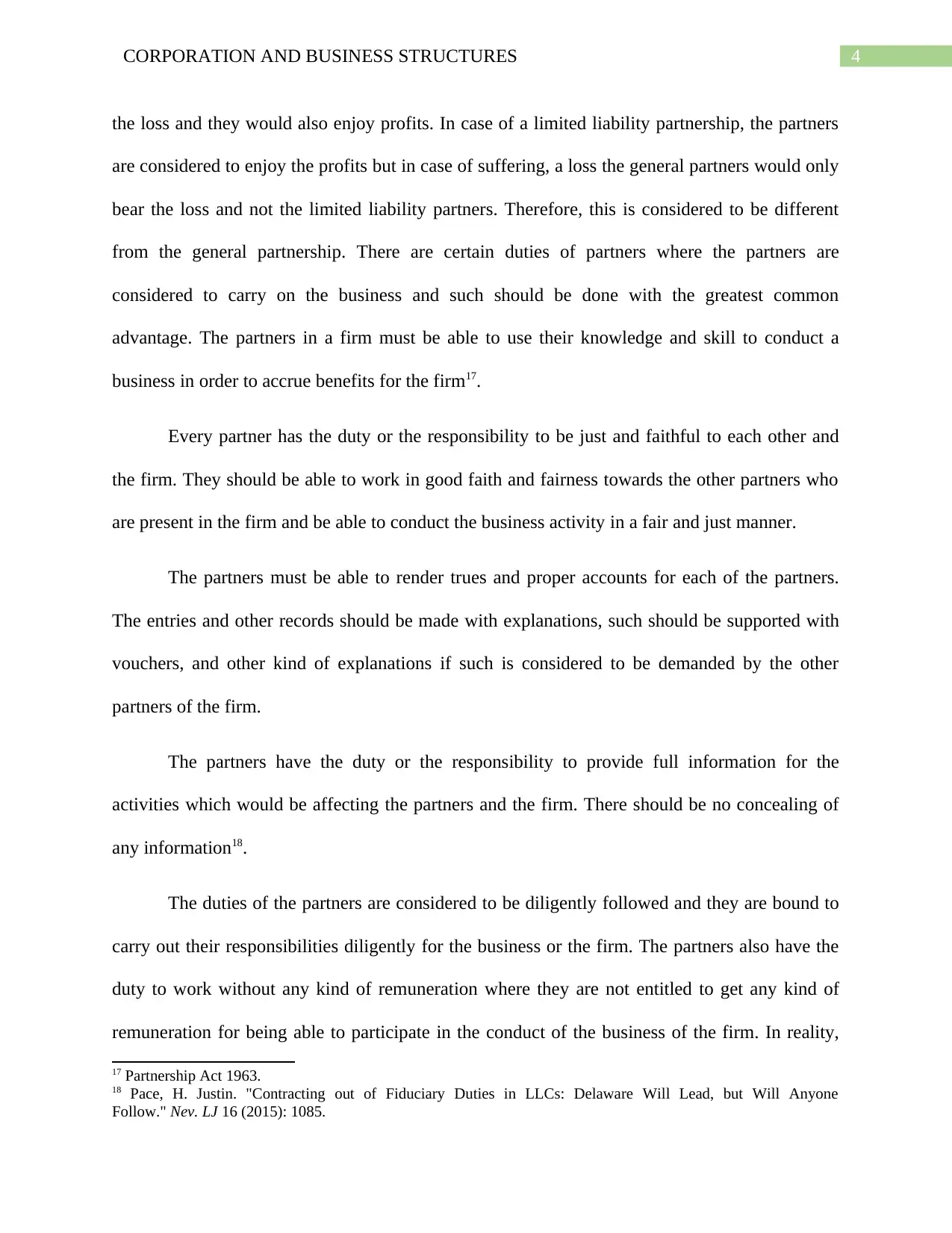
4CORPORATION AND BUSINESS STRUCTURES
the loss and they would also enjoy profits. In case of a limited liability partnership, the partners
are considered to enjoy the profits but in case of suffering, a loss the general partners would only
bear the loss and not the limited liability partners. Therefore, this is considered to be different
from the general partnership. There are certain duties of partners where the partners are
considered to carry on the business and such should be done with the greatest common
advantage. The partners in a firm must be able to use their knowledge and skill to conduct a
business in order to accrue benefits for the firm17.
Every partner has the duty or the responsibility to be just and faithful to each other and
the firm. They should be able to work in good faith and fairness towards the other partners who
are present in the firm and be able to conduct the business activity in a fair and just manner.
The partners must be able to render trues and proper accounts for each of the partners.
The entries and other records should be made with explanations, such should be supported with
vouchers, and other kind of explanations if such is considered to be demanded by the other
partners of the firm.
The partners have the duty or the responsibility to provide full information for the
activities which would be affecting the partners and the firm. There should be no concealing of
any information18.
The duties of the partners are considered to be diligently followed and they are bound to
carry out their responsibilities diligently for the business or the firm. The partners also have the
duty to work without any kind of remuneration where they are not entitled to get any kind of
remuneration for being able to participate in the conduct of the business of the firm. In reality,
17 Partnership Act 1963.
18 Pace, H. Justin. "Contracting out of Fiduciary Duties in LLCs: Delaware Will Lead, but Will Anyone
Follow." Nev. LJ 16 (2015): 1085.
the loss and they would also enjoy profits. In case of a limited liability partnership, the partners
are considered to enjoy the profits but in case of suffering, a loss the general partners would only
bear the loss and not the limited liability partners. Therefore, this is considered to be different
from the general partnership. There are certain duties of partners where the partners are
considered to carry on the business and such should be done with the greatest common
advantage. The partners in a firm must be able to use their knowledge and skill to conduct a
business in order to accrue benefits for the firm17.
Every partner has the duty or the responsibility to be just and faithful to each other and
the firm. They should be able to work in good faith and fairness towards the other partners who
are present in the firm and be able to conduct the business activity in a fair and just manner.
The partners must be able to render trues and proper accounts for each of the partners.
The entries and other records should be made with explanations, such should be supported with
vouchers, and other kind of explanations if such is considered to be demanded by the other
partners of the firm.
The partners have the duty or the responsibility to provide full information for the
activities which would be affecting the partners and the firm. There should be no concealing of
any information18.
The duties of the partners are considered to be diligently followed and they are bound to
carry out their responsibilities diligently for the business or the firm. The partners also have the
duty to work without any kind of remuneration where they are not entitled to get any kind of
remuneration for being able to participate in the conduct of the business of the firm. In reality,
17 Partnership Act 1963.
18 Pace, H. Justin. "Contracting out of Fiduciary Duties in LLCs: Delaware Will Lead, but Will Anyone
Follow." Nev. LJ 16 (2015): 1085.
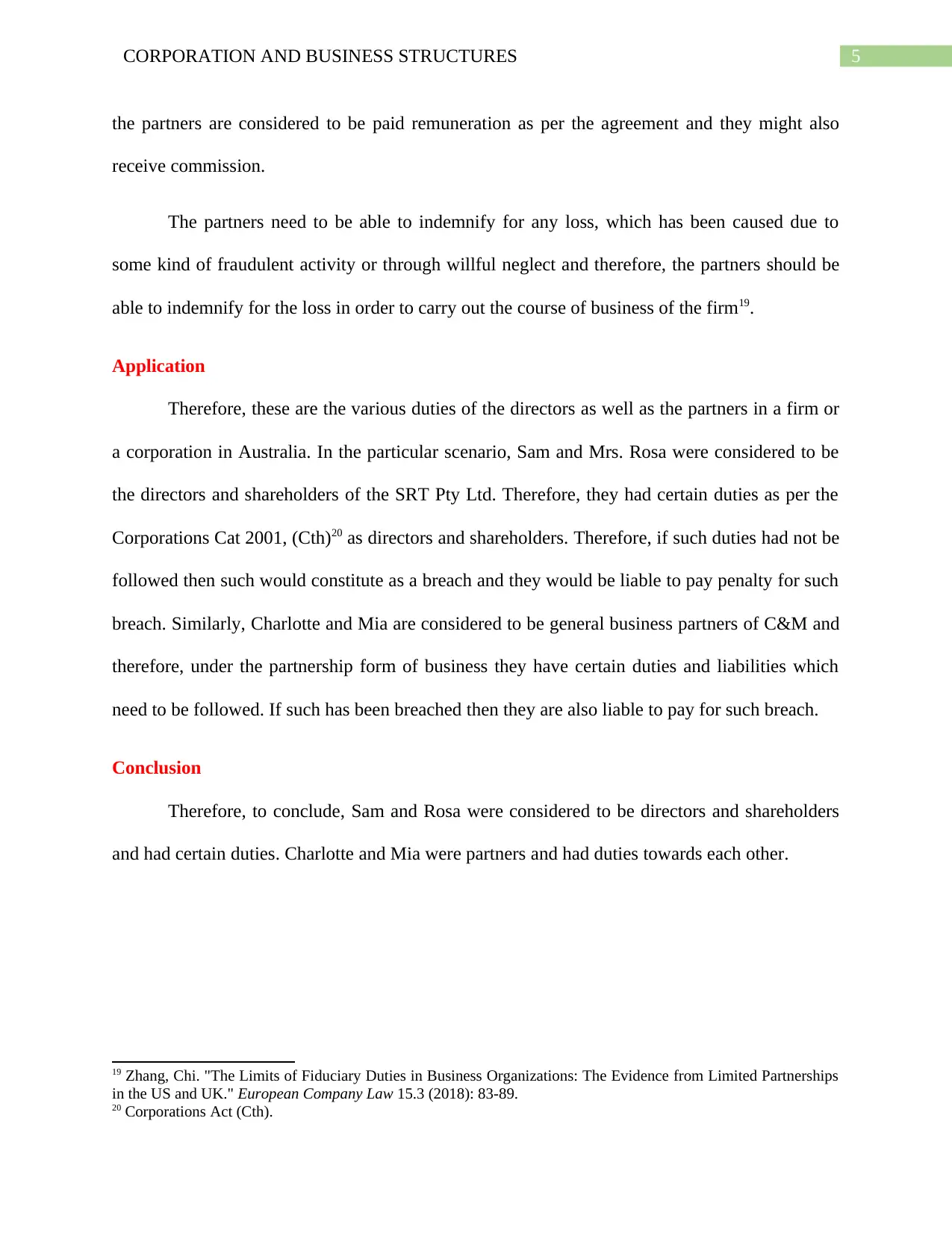
5CORPORATION AND BUSINESS STRUCTURES
the partners are considered to be paid remuneration as per the agreement and they might also
receive commission.
The partners need to be able to indemnify for any loss, which has been caused due to
some kind of fraudulent activity or through willful neglect and therefore, the partners should be
able to indemnify for the loss in order to carry out the course of business of the firm19.
Application
Therefore, these are the various duties of the directors as well as the partners in a firm or
a corporation in Australia. In the particular scenario, Sam and Mrs. Rosa were considered to be
the directors and shareholders of the SRT Pty Ltd. Therefore, they had certain duties as per the
Corporations Cat 2001, (Cth)20 as directors and shareholders. Therefore, if such duties had not be
followed then such would constitute as a breach and they would be liable to pay penalty for such
breach. Similarly, Charlotte and Mia are considered to be general business partners of C&M and
therefore, under the partnership form of business they have certain duties and liabilities which
need to be followed. If such has been breached then they are also liable to pay for such breach.
Conclusion
Therefore, to conclude, Sam and Rosa were considered to be directors and shareholders
and had certain duties. Charlotte and Mia were partners and had duties towards each other.
19 Zhang, Chi. "The Limits of Fiduciary Duties in Business Organizations: The Evidence from Limited Partnerships
in the US and UK." European Company Law 15.3 (2018): 83-89.
20 Corporations Act (Cth).
the partners are considered to be paid remuneration as per the agreement and they might also
receive commission.
The partners need to be able to indemnify for any loss, which has been caused due to
some kind of fraudulent activity or through willful neglect and therefore, the partners should be
able to indemnify for the loss in order to carry out the course of business of the firm19.
Application
Therefore, these are the various duties of the directors as well as the partners in a firm or
a corporation in Australia. In the particular scenario, Sam and Mrs. Rosa were considered to be
the directors and shareholders of the SRT Pty Ltd. Therefore, they had certain duties as per the
Corporations Cat 2001, (Cth)20 as directors and shareholders. Therefore, if such duties had not be
followed then such would constitute as a breach and they would be liable to pay penalty for such
breach. Similarly, Charlotte and Mia are considered to be general business partners of C&M and
therefore, under the partnership form of business they have certain duties and liabilities which
need to be followed. If such has been breached then they are also liable to pay for such breach.
Conclusion
Therefore, to conclude, Sam and Rosa were considered to be directors and shareholders
and had certain duties. Charlotte and Mia were partners and had duties towards each other.
19 Zhang, Chi. "The Limits of Fiduciary Duties in Business Organizations: The Evidence from Limited Partnerships
in the US and UK." European Company Law 15.3 (2018): 83-89.
20 Corporations Act (Cth).
⊘ This is a preview!⊘
Do you want full access?
Subscribe today to unlock all pages.

Trusted by 1+ million students worldwide
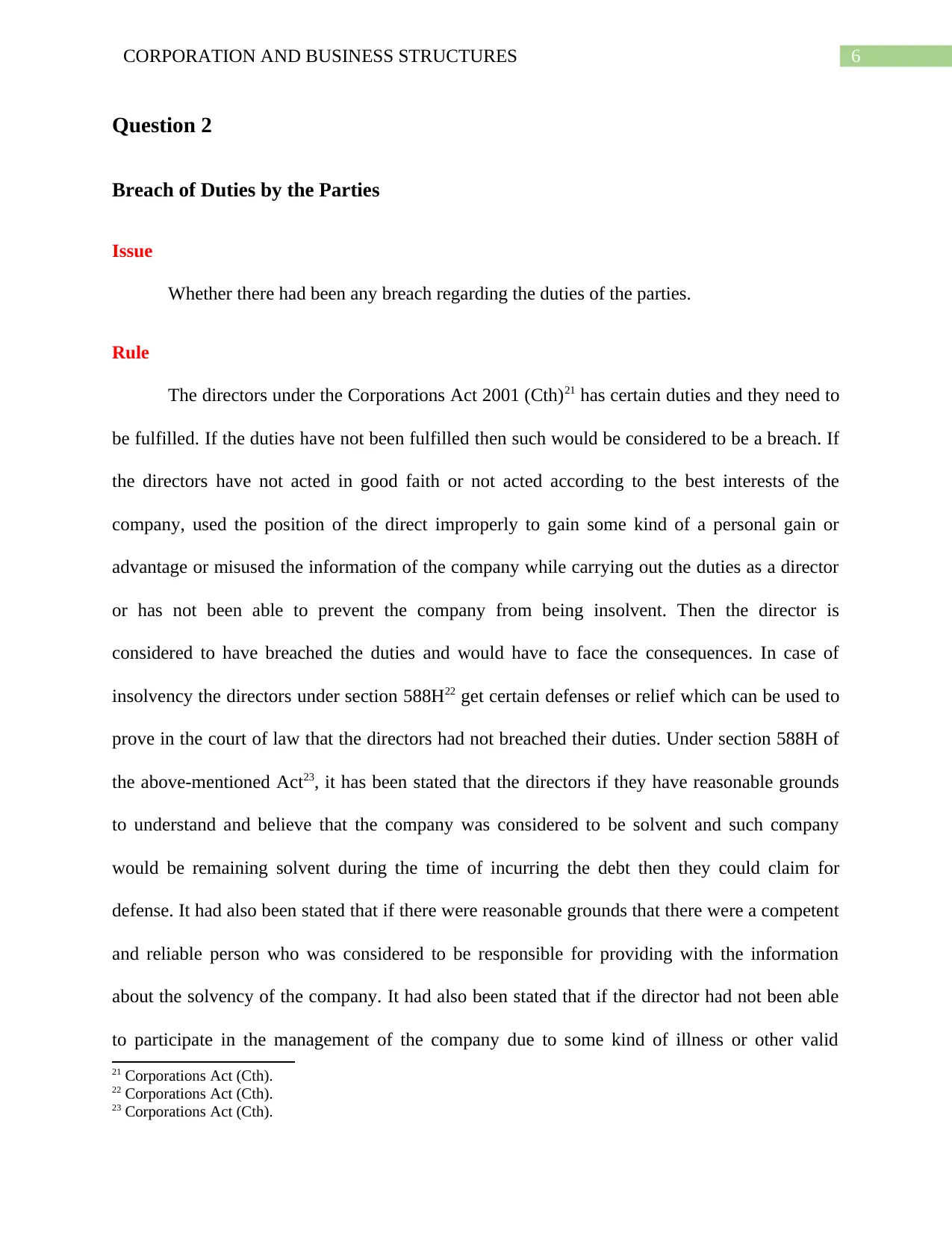
6CORPORATION AND BUSINESS STRUCTURES
Question 2
Breach of Duties by the Parties
Issue
Whether there had been any breach regarding the duties of the parties.
Rule
The directors under the Corporations Act 2001 (Cth)21 has certain duties and they need to
be fulfilled. If the duties have not been fulfilled then such would be considered to be a breach. If
the directors have not acted in good faith or not acted according to the best interests of the
company, used the position of the direct improperly to gain some kind of a personal gain or
advantage or misused the information of the company while carrying out the duties as a director
or has not been able to prevent the company from being insolvent. Then the director is
considered to have breached the duties and would have to face the consequences. In case of
insolvency the directors under section 588H22 get certain defenses or relief which can be used to
prove in the court of law that the directors had not breached their duties. Under section 588H of
the above-mentioned Act23, it has been stated that the directors if they have reasonable grounds
to understand and believe that the company was considered to be solvent and such company
would be remaining solvent during the time of incurring the debt then they could claim for
defense. It had also been stated that if there were reasonable grounds that there were a competent
and reliable person who was considered to be responsible for providing with the information
about the solvency of the company. It had also been stated that if the director had not been able
to participate in the management of the company due to some kind of illness or other valid
21 Corporations Act (Cth).
22 Corporations Act (Cth).
23 Corporations Act (Cth).
Question 2
Breach of Duties by the Parties
Issue
Whether there had been any breach regarding the duties of the parties.
Rule
The directors under the Corporations Act 2001 (Cth)21 has certain duties and they need to
be fulfilled. If the duties have not been fulfilled then such would be considered to be a breach. If
the directors have not acted in good faith or not acted according to the best interests of the
company, used the position of the direct improperly to gain some kind of a personal gain or
advantage or misused the information of the company while carrying out the duties as a director
or has not been able to prevent the company from being insolvent. Then the director is
considered to have breached the duties and would have to face the consequences. In case of
insolvency the directors under section 588H22 get certain defenses or relief which can be used to
prove in the court of law that the directors had not breached their duties. Under section 588H of
the above-mentioned Act23, it has been stated that the directors if they have reasonable grounds
to understand and believe that the company was considered to be solvent and such company
would be remaining solvent during the time of incurring the debt then they could claim for
defense. It had also been stated that if there were reasonable grounds that there were a competent
and reliable person who was considered to be responsible for providing with the information
about the solvency of the company. It had also been stated that if the director had not been able
to participate in the management of the company due to some kind of illness or other valid
21 Corporations Act (Cth).
22 Corporations Act (Cth).
23 Corporations Act (Cth).
Paraphrase This Document
Need a fresh take? Get an instant paraphrase of this document with our AI Paraphraser
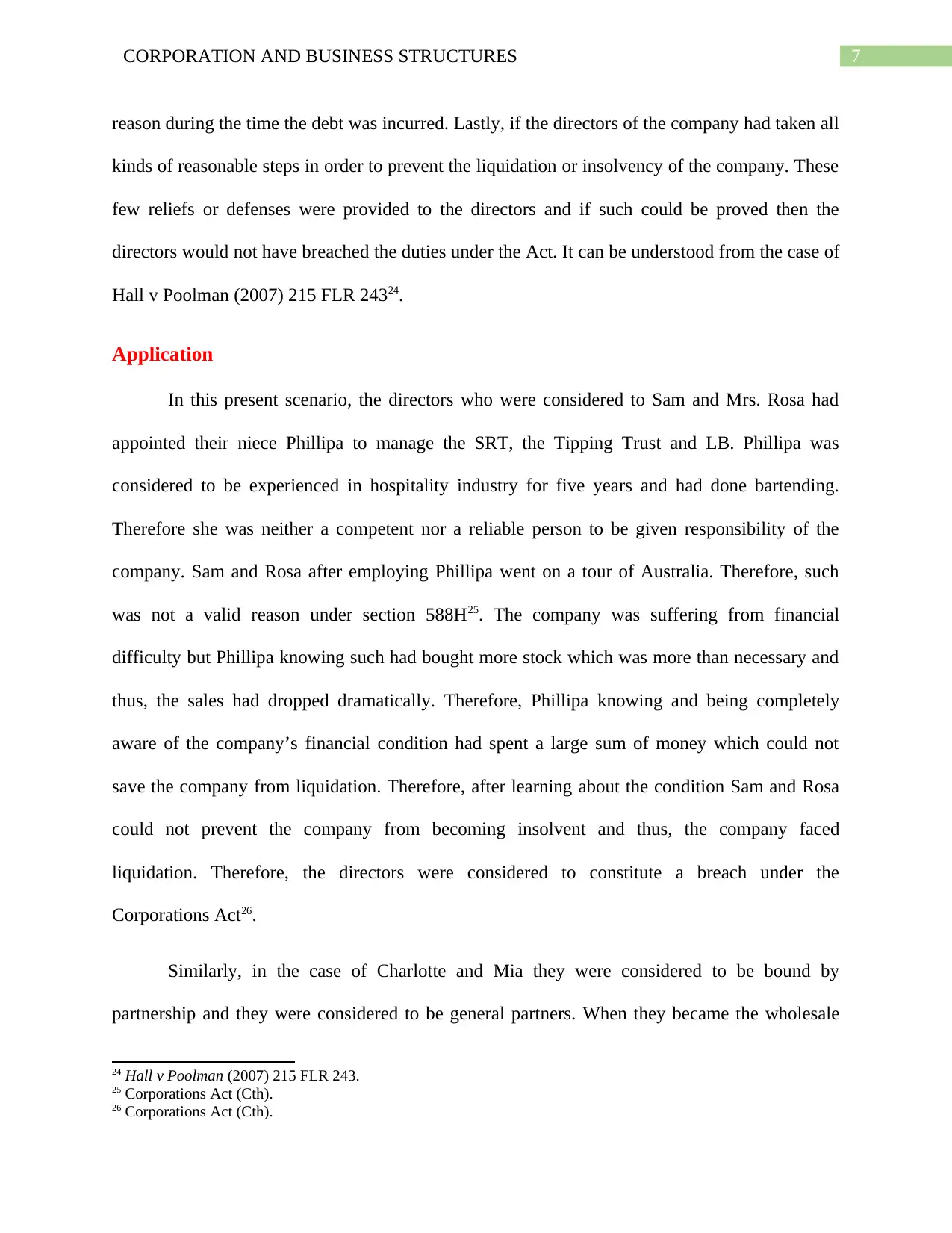
7CORPORATION AND BUSINESS STRUCTURES
reason during the time the debt was incurred. Lastly, if the directors of the company had taken all
kinds of reasonable steps in order to prevent the liquidation or insolvency of the company. These
few reliefs or defenses were provided to the directors and if such could be proved then the
directors would not have breached the duties under the Act. It can be understood from the case of
Hall v Poolman (2007) 215 FLR 24324.
Application
In this present scenario, the directors who were considered to Sam and Mrs. Rosa had
appointed their niece Phillipa to manage the SRT, the Tipping Trust and LB. Phillipa was
considered to be experienced in hospitality industry for five years and had done bartending.
Therefore she was neither a competent nor a reliable person to be given responsibility of the
company. Sam and Rosa after employing Phillipa went on a tour of Australia. Therefore, such
was not a valid reason under section 588H25. The company was suffering from financial
difficulty but Phillipa knowing such had bought more stock which was more than necessary and
thus, the sales had dropped dramatically. Therefore, Phillipa knowing and being completely
aware of the company’s financial condition had spent a large sum of money which could not
save the company from liquidation. Therefore, after learning about the condition Sam and Rosa
could not prevent the company from becoming insolvent and thus, the company faced
liquidation. Therefore, the directors were considered to constitute a breach under the
Corporations Act26.
Similarly, in the case of Charlotte and Mia they were considered to be bound by
partnership and they were considered to be general partners. When they became the wholesale
24 Hall v Poolman (2007) 215 FLR 243.
25 Corporations Act (Cth).
26 Corporations Act (Cth).
reason during the time the debt was incurred. Lastly, if the directors of the company had taken all
kinds of reasonable steps in order to prevent the liquidation or insolvency of the company. These
few reliefs or defenses were provided to the directors and if such could be proved then the
directors would not have breached the duties under the Act. It can be understood from the case of
Hall v Poolman (2007) 215 FLR 24324.
Application
In this present scenario, the directors who were considered to Sam and Mrs. Rosa had
appointed their niece Phillipa to manage the SRT, the Tipping Trust and LB. Phillipa was
considered to be experienced in hospitality industry for five years and had done bartending.
Therefore she was neither a competent nor a reliable person to be given responsibility of the
company. Sam and Rosa after employing Phillipa went on a tour of Australia. Therefore, such
was not a valid reason under section 588H25. The company was suffering from financial
difficulty but Phillipa knowing such had bought more stock which was more than necessary and
thus, the sales had dropped dramatically. Therefore, Phillipa knowing and being completely
aware of the company’s financial condition had spent a large sum of money which could not
save the company from liquidation. Therefore, after learning about the condition Sam and Rosa
could not prevent the company from becoming insolvent and thus, the company faced
liquidation. Therefore, the directors were considered to constitute a breach under the
Corporations Act26.
Similarly, in the case of Charlotte and Mia they were considered to be bound by
partnership and they were considered to be general partners. When they became the wholesale
24 Hall v Poolman (2007) 215 FLR 243.
25 Corporations Act (Cth).
26 Corporations Act (Cth).
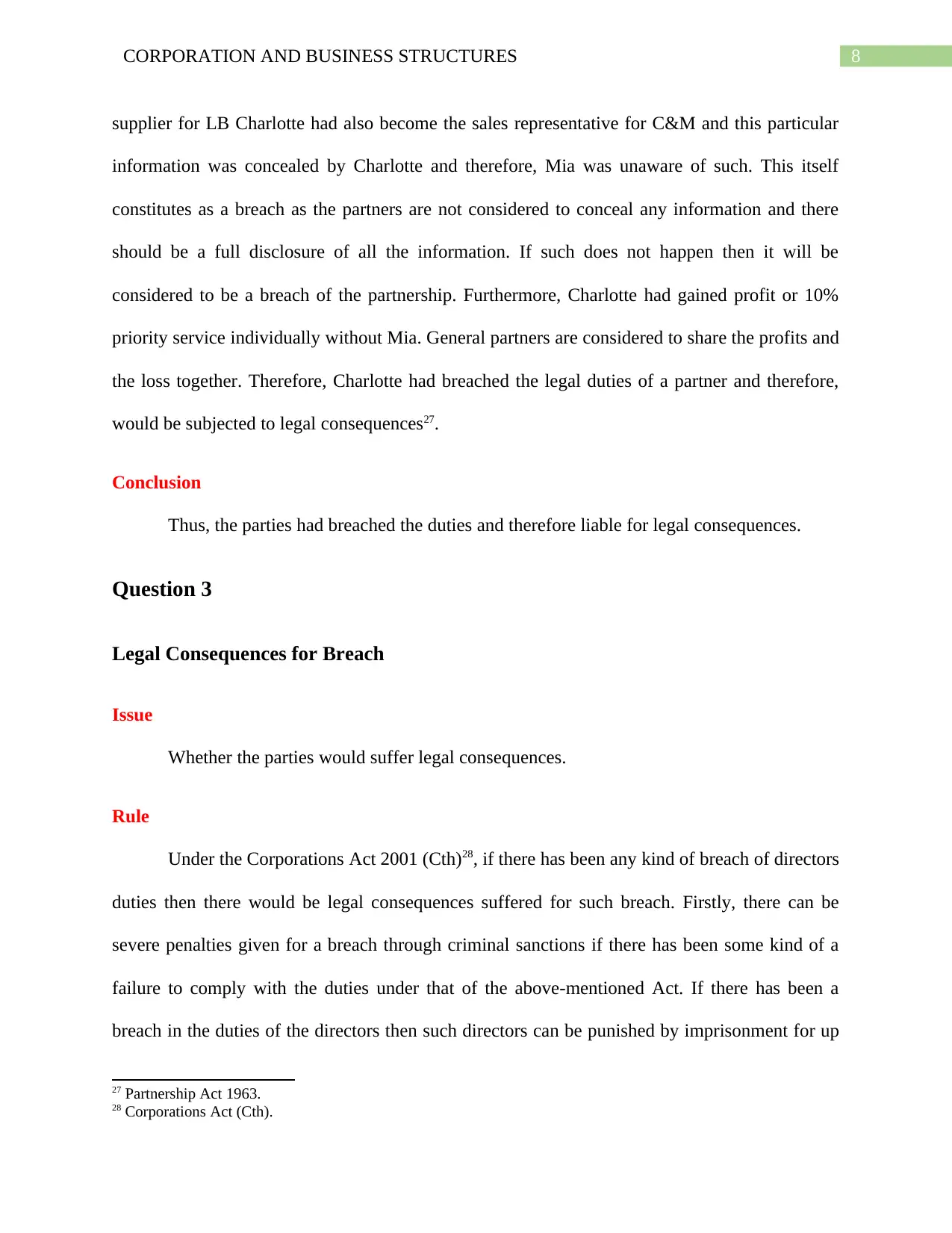
8CORPORATION AND BUSINESS STRUCTURES
supplier for LB Charlotte had also become the sales representative for C&M and this particular
information was concealed by Charlotte and therefore, Mia was unaware of such. This itself
constitutes as a breach as the partners are not considered to conceal any information and there
should be a full disclosure of all the information. If such does not happen then it will be
considered to be a breach of the partnership. Furthermore, Charlotte had gained profit or 10%
priority service individually without Mia. General partners are considered to share the profits and
the loss together. Therefore, Charlotte had breached the legal duties of a partner and therefore,
would be subjected to legal consequences27.
Conclusion
Thus, the parties had breached the duties and therefore liable for legal consequences.
Question 3
Legal Consequences for Breach
Issue
Whether the parties would suffer legal consequences.
Rule
Under the Corporations Act 2001 (Cth)28, if there has been any kind of breach of directors
duties then there would be legal consequences suffered for such breach. Firstly, there can be
severe penalties given for a breach through criminal sanctions if there has been some kind of a
failure to comply with the duties under that of the above-mentioned Act. If there has been a
breach in the duties of the directors then such directors can be punished by imprisonment for up
27 Partnership Act 1963.
28 Corporations Act (Cth).
supplier for LB Charlotte had also become the sales representative for C&M and this particular
information was concealed by Charlotte and therefore, Mia was unaware of such. This itself
constitutes as a breach as the partners are not considered to conceal any information and there
should be a full disclosure of all the information. If such does not happen then it will be
considered to be a breach of the partnership. Furthermore, Charlotte had gained profit or 10%
priority service individually without Mia. General partners are considered to share the profits and
the loss together. Therefore, Charlotte had breached the legal duties of a partner and therefore,
would be subjected to legal consequences27.
Conclusion
Thus, the parties had breached the duties and therefore liable for legal consequences.
Question 3
Legal Consequences for Breach
Issue
Whether the parties would suffer legal consequences.
Rule
Under the Corporations Act 2001 (Cth)28, if there has been any kind of breach of directors
duties then there would be legal consequences suffered for such breach. Firstly, there can be
severe penalties given for a breach through criminal sanctions if there has been some kind of a
failure to comply with the duties under that of the above-mentioned Act. If there has been a
breach in the duties of the directors then such directors can be punished by imprisonment for up
27 Partnership Act 1963.
28 Corporations Act (Cth).
⊘ This is a preview!⊘
Do you want full access?
Subscribe today to unlock all pages.

Trusted by 1+ million students worldwide
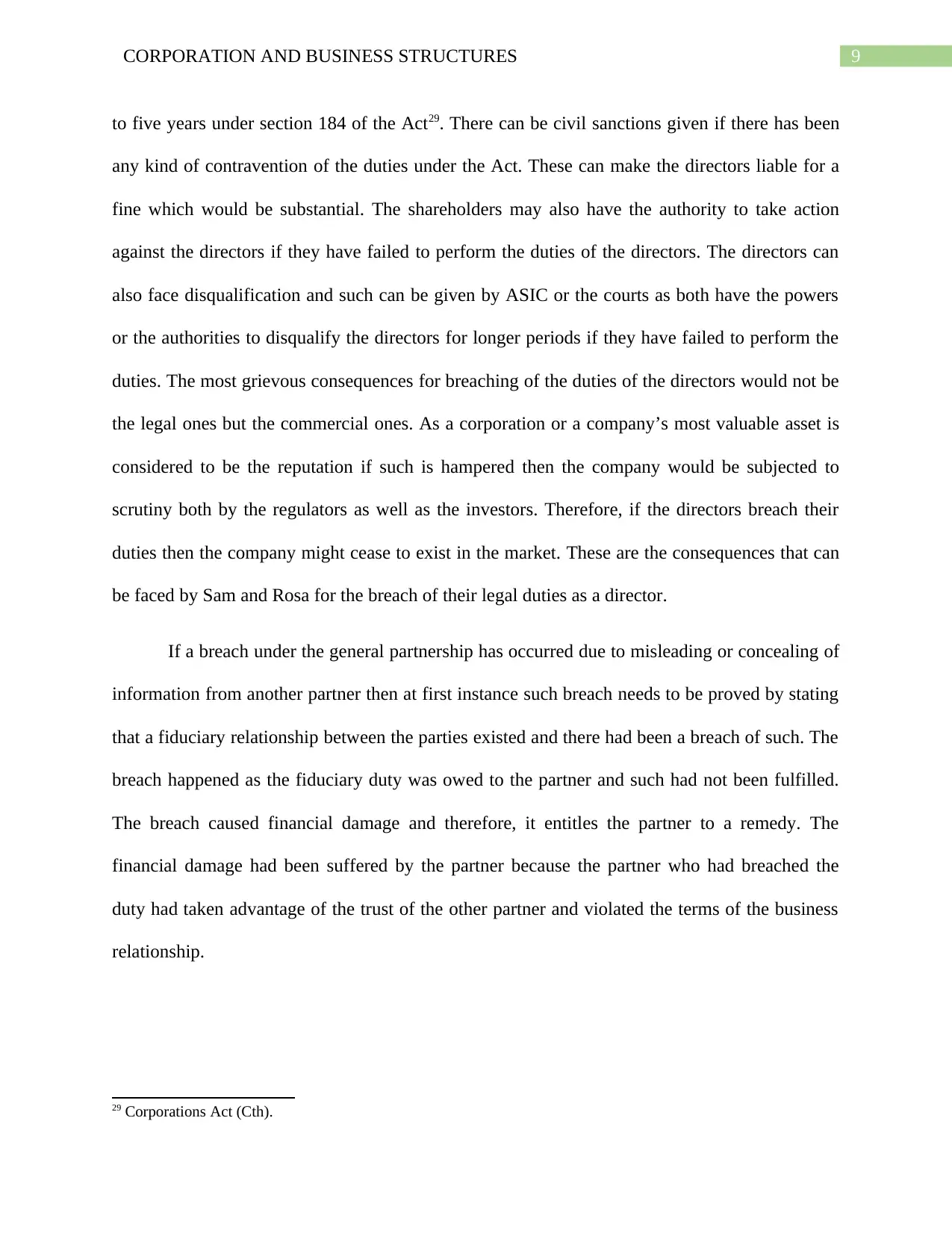
9CORPORATION AND BUSINESS STRUCTURES
to five years under section 184 of the Act29. There can be civil sanctions given if there has been
any kind of contravention of the duties under the Act. These can make the directors liable for a
fine which would be substantial. The shareholders may also have the authority to take action
against the directors if they have failed to perform the duties of the directors. The directors can
also face disqualification and such can be given by ASIC or the courts as both have the powers
or the authorities to disqualify the directors for longer periods if they have failed to perform the
duties. The most grievous consequences for breaching of the duties of the directors would not be
the legal ones but the commercial ones. As a corporation or a company’s most valuable asset is
considered to be the reputation if such is hampered then the company would be subjected to
scrutiny both by the regulators as well as the investors. Therefore, if the directors breach their
duties then the company might cease to exist in the market. These are the consequences that can
be faced by Sam and Rosa for the breach of their legal duties as a director.
If a breach under the general partnership has occurred due to misleading or concealing of
information from another partner then at first instance such breach needs to be proved by stating
that a fiduciary relationship between the parties existed and there had been a breach of such. The
breach happened as the fiduciary duty was owed to the partner and such had not been fulfilled.
The breach caused financial damage and therefore, it entitles the partner to a remedy. The
financial damage had been suffered by the partner because the partner who had breached the
duty had taken advantage of the trust of the other partner and violated the terms of the business
relationship.
29 Corporations Act (Cth).
to five years under section 184 of the Act29. There can be civil sanctions given if there has been
any kind of contravention of the duties under the Act. These can make the directors liable for a
fine which would be substantial. The shareholders may also have the authority to take action
against the directors if they have failed to perform the duties of the directors. The directors can
also face disqualification and such can be given by ASIC or the courts as both have the powers
or the authorities to disqualify the directors for longer periods if they have failed to perform the
duties. The most grievous consequences for breaching of the duties of the directors would not be
the legal ones but the commercial ones. As a corporation or a company’s most valuable asset is
considered to be the reputation if such is hampered then the company would be subjected to
scrutiny both by the regulators as well as the investors. Therefore, if the directors breach their
duties then the company might cease to exist in the market. These are the consequences that can
be faced by Sam and Rosa for the breach of their legal duties as a director.
If a breach under the general partnership has occurred due to misleading or concealing of
information from another partner then at first instance such breach needs to be proved by stating
that a fiduciary relationship between the parties existed and there had been a breach of such. The
breach happened as the fiduciary duty was owed to the partner and such had not been fulfilled.
The breach caused financial damage and therefore, it entitles the partner to a remedy. The
financial damage had been suffered by the partner because the partner who had breached the
duty had taken advantage of the trust of the other partner and violated the terms of the business
relationship.
29 Corporations Act (Cth).
Paraphrase This Document
Need a fresh take? Get an instant paraphrase of this document with our AI Paraphraser
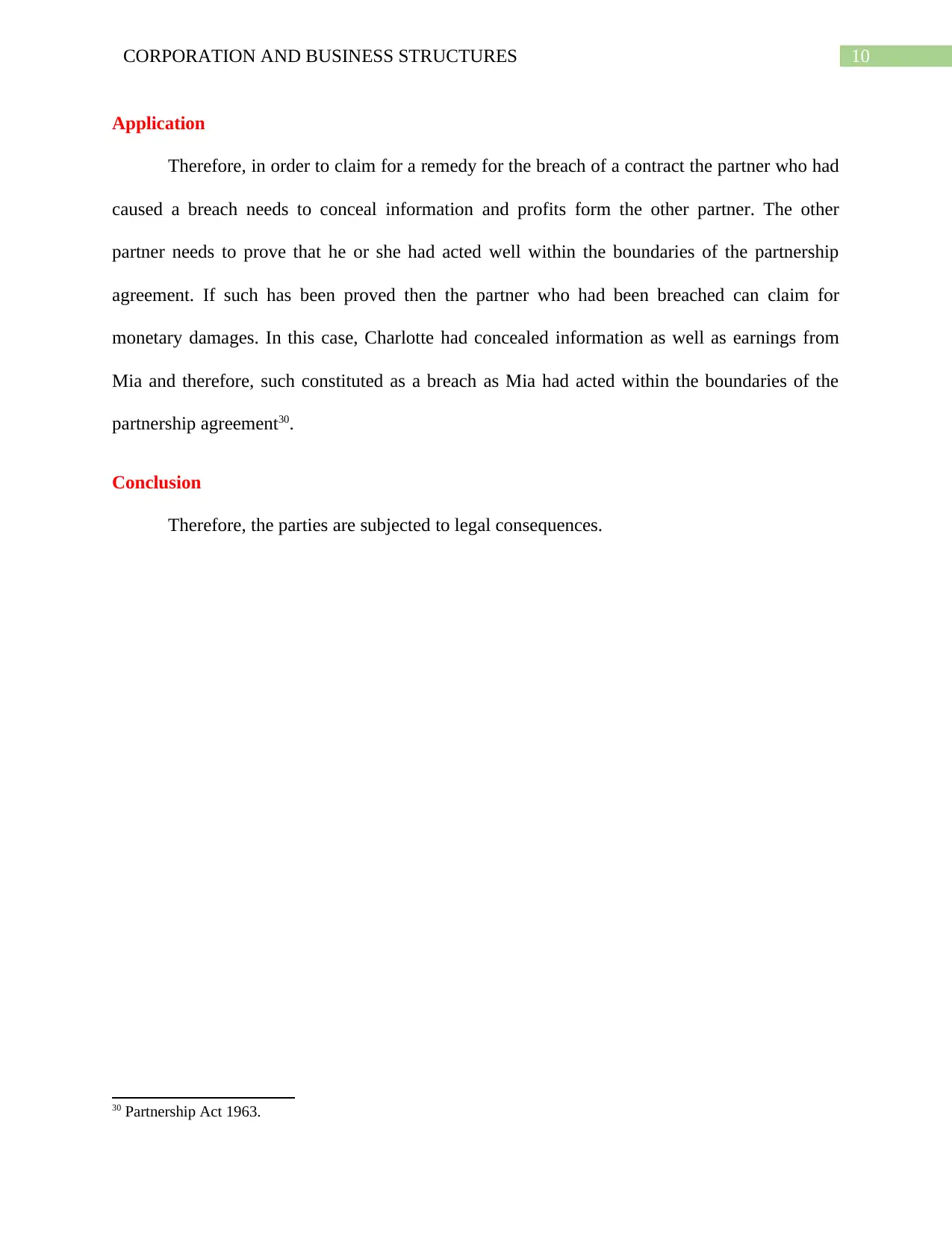
10CORPORATION AND BUSINESS STRUCTURES
Application
Therefore, in order to claim for a remedy for the breach of a contract the partner who had
caused a breach needs to conceal information and profits form the other partner. The other
partner needs to prove that he or she had acted well within the boundaries of the partnership
agreement. If such has been proved then the partner who had been breached can claim for
monetary damages. In this case, Charlotte had concealed information as well as earnings from
Mia and therefore, such constituted as a breach as Mia had acted within the boundaries of the
partnership agreement30.
Conclusion
Therefore, the parties are subjected to legal consequences.
30 Partnership Act 1963.
Application
Therefore, in order to claim for a remedy for the breach of a contract the partner who had
caused a breach needs to conceal information and profits form the other partner. The other
partner needs to prove that he or she had acted well within the boundaries of the partnership
agreement. If such has been proved then the partner who had been breached can claim for
monetary damages. In this case, Charlotte had concealed information as well as earnings from
Mia and therefore, such constituted as a breach as Mia had acted within the boundaries of the
partnership agreement30.
Conclusion
Therefore, the parties are subjected to legal consequences.
30 Partnership Act 1963.
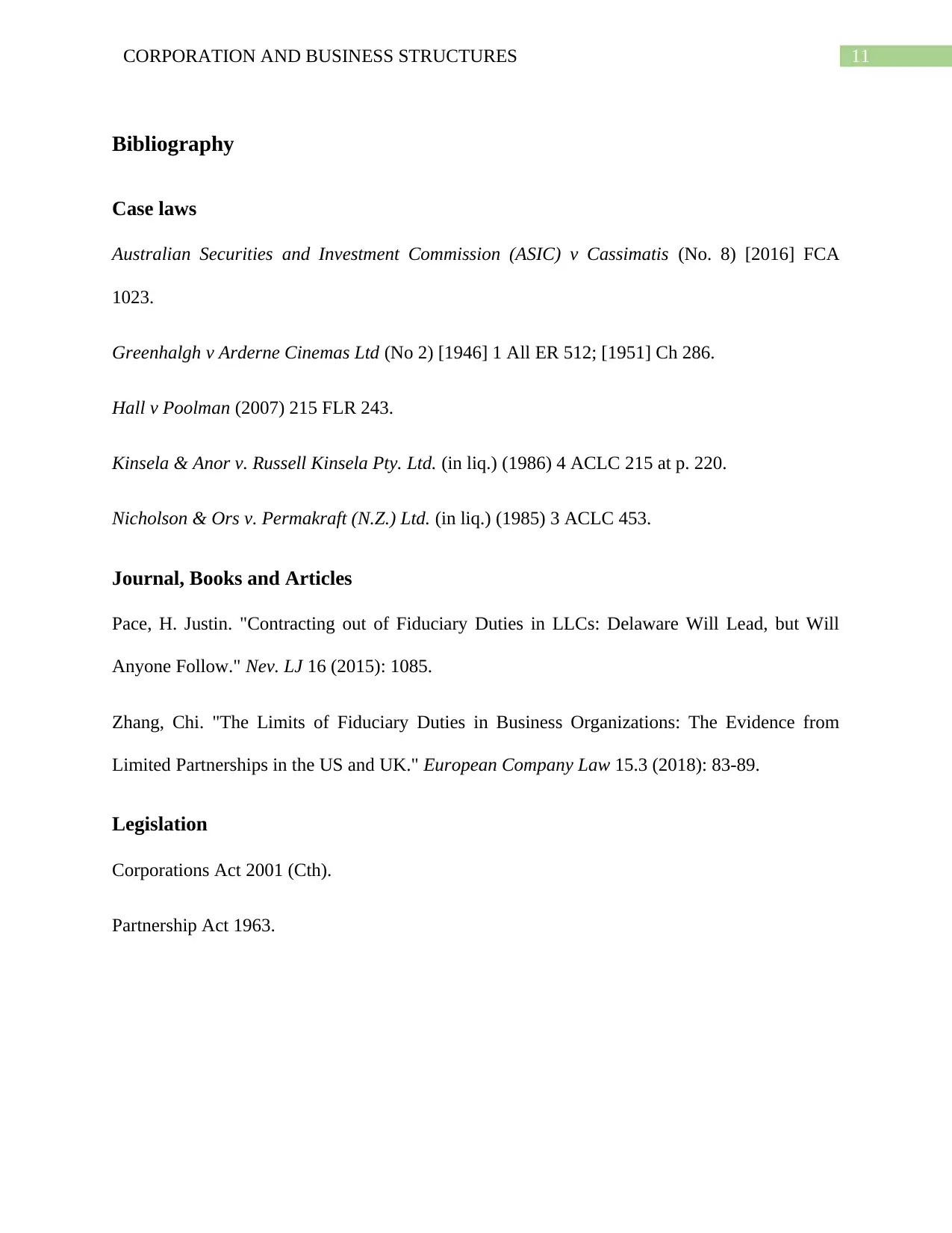
11CORPORATION AND BUSINESS STRUCTURES
Bibliography
Case laws
Australian Securities and Investment Commission (ASIC) v Cassimatis (No. 8) [2016] FCA
1023.
Greenhalgh v Arderne Cinemas Ltd (No 2) [1946] 1 All ER 512; [1951] Ch 286.
Hall v Poolman (2007) 215 FLR 243.
Kinsela & Anor v. Russell Kinsela Pty. Ltd. (in liq.) (1986) 4 ACLC 215 at p. 220.
Nicholson & Ors v. Permakraft (N.Z.) Ltd. (in liq.) (1985) 3 ACLC 453.
Journal, Books and Articles
Pace, H. Justin. "Contracting out of Fiduciary Duties in LLCs: Delaware Will Lead, but Will
Anyone Follow." Nev. LJ 16 (2015): 1085.
Zhang, Chi. "The Limits of Fiduciary Duties in Business Organizations: The Evidence from
Limited Partnerships in the US and UK." European Company Law 15.3 (2018): 83-89.
Legislation
Corporations Act 2001 (Cth).
Partnership Act 1963.
Bibliography
Case laws
Australian Securities and Investment Commission (ASIC) v Cassimatis (No. 8) [2016] FCA
1023.
Greenhalgh v Arderne Cinemas Ltd (No 2) [1946] 1 All ER 512; [1951] Ch 286.
Hall v Poolman (2007) 215 FLR 243.
Kinsela & Anor v. Russell Kinsela Pty. Ltd. (in liq.) (1986) 4 ACLC 215 at p. 220.
Nicholson & Ors v. Permakraft (N.Z.) Ltd. (in liq.) (1985) 3 ACLC 453.
Journal, Books and Articles
Pace, H. Justin. "Contracting out of Fiduciary Duties in LLCs: Delaware Will Lead, but Will
Anyone Follow." Nev. LJ 16 (2015): 1085.
Zhang, Chi. "The Limits of Fiduciary Duties in Business Organizations: The Evidence from
Limited Partnerships in the US and UK." European Company Law 15.3 (2018): 83-89.
Legislation
Corporations Act 2001 (Cth).
Partnership Act 1963.
⊘ This is a preview!⊘
Do you want full access?
Subscribe today to unlock all pages.

Trusted by 1+ million students worldwide
1 out of 12
Related Documents
Your All-in-One AI-Powered Toolkit for Academic Success.
+13062052269
info@desklib.com
Available 24*7 on WhatsApp / Email
![[object Object]](/_next/static/media/star-bottom.7253800d.svg)
Unlock your academic potential
Copyright © 2020–2026 A2Z Services. All Rights Reserved. Developed and managed by ZUCOL.





![Analysis of Asden Developments Pty Ltd v Dinoris (No 3) [2016] FCA 788](/_next/image/?url=https%3A%2F%2Fdesklib.com%2Fmedia%2Fliquidator-breach-of-duties_page_2.jpg&w=256&q=75)